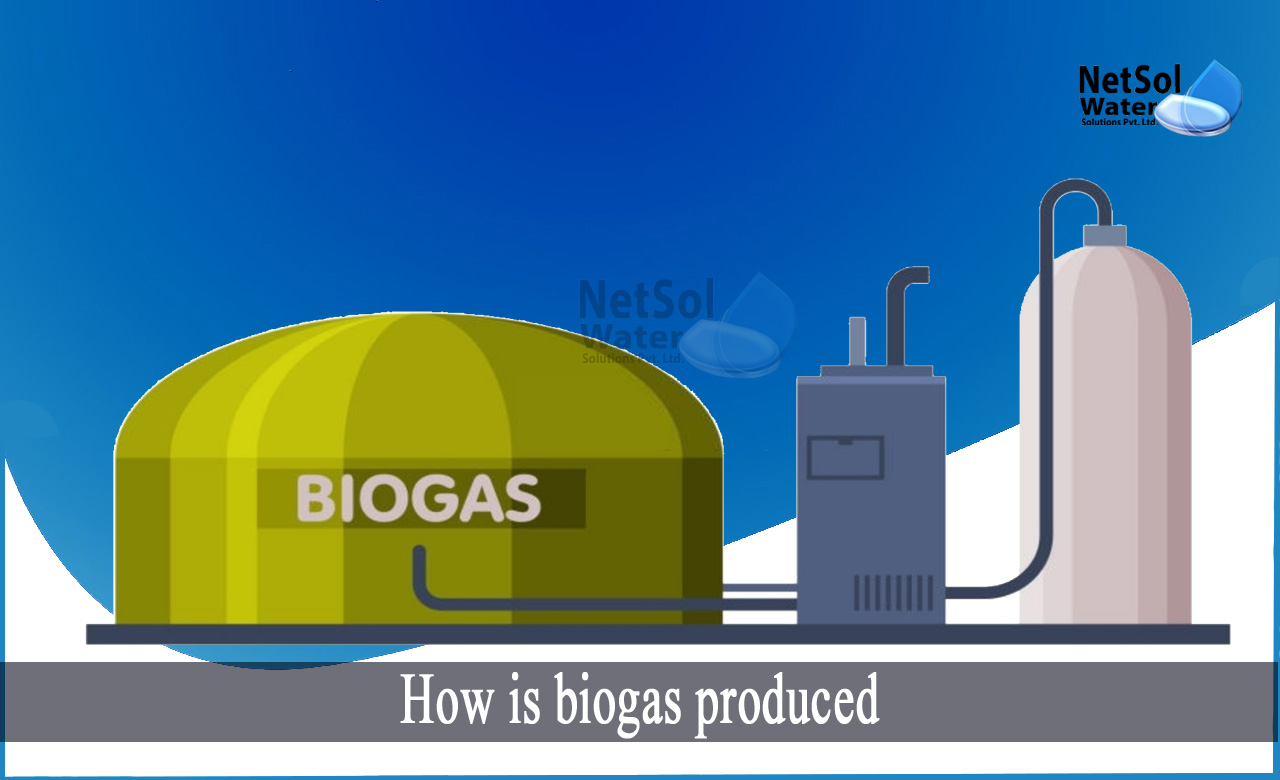India produces around 62 million tonnes of municipal solid waste (MSW) annually, of which almost half is organic. When improperly disposed of, this organic waste decomposes and emits methane. To help reduce pollution, improve livelihoods, and improve quality of life, this harmful gas can be employed in the manufacture of biogas, rather than being released directly into the atmosphere.
Numerous industries use biological techniques to remediate their effluent. Biogas generated by the anaerobic process can power the treatment plant's operations. This lowers the cost of fossil fuels and energy.
Let's first learn more about biogas before moving on to the anaerobic operation, of the wastewater treatment facility.
What is biogas?
When organic matter breaks down without oxygen, a renewable energy source called biogas, also known as bio methane, is created. It can be found naturally or as part of a manufacturing process for use as fuel.
It mostly comprises of 30–40% carbon dioxide and 50–70% methane, with traces of moisture and other constituents including hydrogen sulphide and siloxanes. However, the proportions change based on the kind of waste, used to create the resulting biogas.
Advantages of utilizing biogas
In terms of turning energy sources into electricity, biogas is said to be quite effective. It offers operators a number of advantages, such as reduced power costs, the elimination of power outage hazards, and enhanced sustainability profiles.
Biogas can be used to generate electricity that has no carbon footprint, because it is currently available, dependable, and inexpensive.
How is biogas produced?
Several probable sources that produce biogas include:
· Agricultural Waste
Nutrients found in animal manure serve as a biogas substrate. Manure from livestock—including cattle and poultry—helps produce the necessary biomethane in manageable amounts, for biogas production.
· Solid waste or garbage waste
This energy source creates biogas using waste from residential processes. Organic materials that are appropriate for decomposing, and generating biogas can be found in landfills.
· Activated Sludge through ETP/STP
Organic materials are present in the effluents that are sent to the wastewater treatment facility. The decomposition chamber receives the activated sludge, where methane is produced.
Modern sewage treatment facilities carry out effective, impurity-free processing. The effluent and sewage sludge produced as a by-product, is used as an energy source.
In the biological treatment step of ETP/STP, microorganisms work on the waste to degrade the organic material. Both aerobic and anaerobic methods of deterioration are possible, depending on the amount of oxygen present. Methane and carbon dioxide are produced when microbes break down organic material, in the absence of oxygen. This can be utilized to produce biogas.
· Biogas production from WWTPs
The wastewater treatment plants include biological treatment. Anaerobic digestion, a stage of biological treatment, involves the breakdown of organic material like animal manure, wastewater bio-solids, and food wastes by bacteria in the treatment facility, without the presence of oxygen.
A biodigester is a sealed container where anaerobic digestion takes place. In accordance with the location and feedstock conditions, the digester is planned and built in a variety of sizes and shapes. These reactors decompose the waste and create biogas as a by-product.
Multiple organic materials are blended in a digester for co-digestion. Manure, food waste from production, distribution, and consumer sources, crop residues, fats, oils, and greases (FOG), and many other substances are examples of co-digested materials. It assists in boosting biogas production from organic waste, which is low yielding or challenging to digest.
However, the anaerobic process can occasionally go wrong.The following are a few of the frequent issues with the system:
· Oxygen exposure
· System-upsetting effluent variation
· Temperature swings
· Foam production
These typical problems may have an indirect effect on the operation of the treatment plant, and may have an impact on biogas output.
How can we solve these problems?
Ingenious remedies have been created by Netsol Water to address these issues. With our more than 10 years of research experience, we assist companies by analysing the issue at the treatment plant, and thus offering a customized solution.
Advantages of our biogas production facilities
· These can decompose complex organics and resistant natural chemicals.
· These are effective throughout a wide temperature and pH range.
· These lower the volume of sludge.
· These increase biogas production.
· These reduce odour.
As more individuals choose sustainable energy sources in order to reduce their energy costs, and protect the environment, the demand for biogas technology is rising.Because, their main function is to clean effluents and use methane in the manufacture of biogas, wastewater treatment plants are able to create biogas on a big scale.
Choosing the best manufacturer of wastewater treatment plants in India
Netsol Water is one of the top businesses offering effective wastewater management solutions. Our advanced treatment products aid in the treatment of wastewater, reducing organics, inorganics, FOGs, TDS levels, heavy metals and other microscopic organisms, with the elimination of unpleasant odours, as well as helps in managing and minimizing the sludge to produce biogas.
The majority of the effluents discharged from the meat processing plants are treated anaerobically. Our all-natural remedy can assist in resolving issues and maintaining the plant's smooth general operation!
Netsol Water is Greater Noida-based leading water & wastewater treatment plant manufacturer. We are industry's most demanding company based on client review and work quality. We are known as best commercial RO plant manufacturers, industrial RO plant manufacturer, sewage treatment plant manufacturer, Water Softener Plant Manufacturers and effluent treatment plant manufacturers. Apart from this 24x7 customer support is our USP. Call on +91-9650608473, or write us at enquiry@netsolwater.com for any support, inquiry or product-purchase related query.



